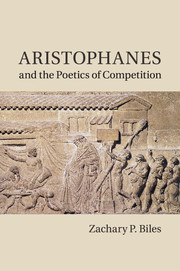Book contents
- Frontmatter
- Contents
- Acknowledgments
- List of abbreviations
- Introduction: proagon
- 1 From Thamyris to Aristophanes: the competitive poetics of the comic parabasis
- 2 The competitive partnership of Aristophanes and Dikaiopolis in Acharnians
- 3 Aristophanes' poetic tropaion: competitive didaskalia and contest records in Knights
- 4 Intertextual biography in the rivalry of Cratinus and Aristophanes
- 5 Aristophanes' Clouds-palinode
- 6 Dionysos and Dionysia in Frogs
- Bibliography
- General index
- Index of passages
4 - Intertextual biography in the rivalry of Cratinus and Aristophanes
Published online by Cambridge University Press: 25 January 2011
- Frontmatter
- Contents
- Acknowledgments
- List of abbreviations
- Introduction: proagon
- 1 From Thamyris to Aristophanes: the competitive poetics of the comic parabasis
- 2 The competitive partnership of Aristophanes and Dikaiopolis in Acharnians
- 3 Aristophanes' poetic tropaion: competitive didaskalia and contest records in Knights
- 4 Intertextual biography in the rivalry of Cratinus and Aristophanes
- 5 Aristophanes' Clouds-palinode
- 6 Dionysos and Dionysia in Frogs
- Bibliography
- General index
- Index of passages
Summary
The slight against Cratinus through the theme of record-keeping argued for in Chapter 3 may be more personal than I suggested, for a precedent perhaps exists in one of Cratinus' own plays. We have a single trochaic tetrameter from Didaskaliai, and although working with fragmentary plays is always challenging, the title makes speculation tempting. Didaskaliai incorporates a professional term for dramatic production, and it thus appears that in this comedy Cratinus, like Aristophanes in the Knights parabasis, reflected openly on matters pertaining to the production of his plays. The content of the fragment provides further reason to believe that this was so:
ὅτε σὺ τοὺς καλοὺς θριάμβους ἀναρύτουσ᾿ ἀπηχθάνου
(Cratinus fr. 38)… when you were despised, though you ladled up fine dithyrambs
The addressee is apparently consoled for failing to impress in a poetic display. The term for poetry, thriamboi, is identified by Hesychius and other ancient sources as equivalent to “dithyramb,” the choral genre originally associated with Dionysian worship. Given the report elsewhere that Cratinus adopted this form in his comedies (fr. 20) in a passage where ad hominem abuse was in evidence, it is a reasonable conclusion that with thriamboi he had in mind the vituperative comic mode for which he became notorious. Support for that position can be found in a lurking allusion to Archilochus' assertion about the connection between wine and dithyramb (fr. 120W2), since Cratinus cultivated a connection with Archilochus as a feature of his poetic identity.
- Type
- Chapter
- Information
- Aristophanes and the Poetics of Competition , pp. 134 - 166Publisher: Cambridge University PressPrint publication year: 2011

